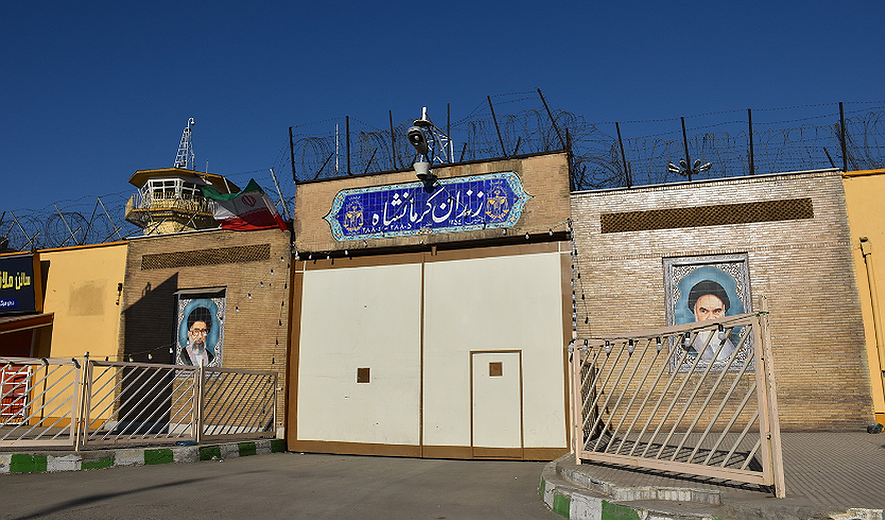Massoud Esfandiari and Juvenile Offender Sajad Sanjari Executed in Kermanshah

Iran Human Rights (IHR); August 7, 2021: Juvenile offender Sajad Sanjari who was sentenced to qisas(retribution-in-kind) for murder was executed in Kermanshah Central Prison last week. Massoud Esfandiari was also executed at the same prison and on the same charge in June.
Juvenile offender Sajad Sanjari (Chalabeh) was executed on the morning of August 2 in Kermanshah Central Prison (Dizelabad). News of his execution was first reported by Amnesty International and has now been confirmed by Iran Human Rights. He was sentenced to qisas for murder.
Sajad Sanjari was born on 19 July 1995 and was arrested for the fatal stabbing on 2 August 2010, making him just 15 years old at the time of the crime.
His funeral was held on August 3 after his body was released to his family.
Speaking to IHR, one of his relative said: “The victim was a year older than Sajad and had tried to rape him.”
“Sajad was sent to the forensic medical examiner twice and despite only being 15 at the time of the crime, he was deemed to have reached full mental maturity,” they added.
According to Article 91 of the new Islamic Penal Code, passed in 2013, “In the cases of offences punishable by hadd or qisas, if mature people under eighteen years do not realise the nature of the crime committed or its prohibition, or if there is uncertainty about their full mental development, according to their age, they shall be sentenced to the punishments prescribed in this chapter.” The note to the Article gives judges the power to determine the defendant's mental capacity: “The court may ask the opinion of forensic medicine or resort to any other method that it sees appropriate in order to establish the full mental development.”
Sajad Sanjari was sentenced to qisas by Branch Two of the Kermanshah province Criminal Court and had been held in the Kermanshah Correctional Centre until 2016. After being transferred to Kermanshah Central Prison, he was transferred for execution in January 2016 which was halted after international pressure. Upon his return to the ward, Sajad was transferred to the counselling ward of Kermanshah Central Prison where he was held until his execution.
Another prisoner at the same prison, Massoud Esfandiari, 35, was executed in June in complete media silence. He had also been sentenced to qisas for murder.
“Massoud Esfandiari had killed his fiancé who was also his cousin, around 13 years ago. The victim’s family refused to forgo their right to retribution and were even forced to pay 160 million tomans, half the diya (blood money) amount because the victim was a woman,” an informed source told IHR.
At the time of writing, neither of their executions have been reported by domestic media or officials in Iran.
According to Iran Human Rights’ Annual Report on the Death Penalty, at least 211 of the 267 people executed in 2020 were sentenced to qisas (retribution-in-kind) for "premeditated murder."
As there are no legal distinctions made between murder and manslaughter, whether voluntary or involuntary in Iran, those charged under the umbrella term of “premeditated murder” will receive the death penalty regardless of intent and the circumstances.
Iran is one of the few countries in the world that still carries out the death penalty for juvenile offenders. The International Covenant on Civil and Political Rights which the Islamic Republic is also a signatory to, prohibits the issuance and implementation of the death penalty for crimes committed by an individual below 18 years of age.
The Convention on the Rights of the Child, which the Islamic Republic is also a signatory to, explicitly states that “Neither capital punishment nor life imprisonment without possibility of release shall be imposed for offences committed by persons below eighteen years of age.”
Yet, according to data collected by IHR and international human rights organisations, the Islamic Republic is responsible for more than 70% of all executions of juvenile offenders in the last 30 years. IHR’s statistics also show that at least 63 juvenile offenders have been executed in Iran over the past 10 years, with at least six being executed in 2018 and four in 2019.
It should be noted that of the four juvenile offenders executed in 2020, only one was reported by domestic media or officials; of the four in 2019, two were reported and of the six in 2018, two were reported.
Given the security state and repression of civil society activists and the limited contact with prisoners, it is likely that the number of juvenile executions is much higher than recorded.

